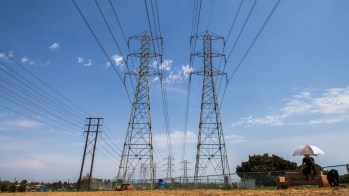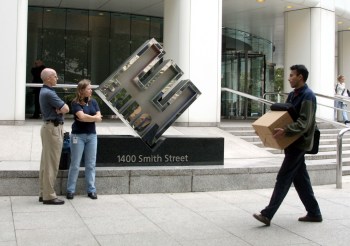Amaranth found room in Enron loophole
TEXT OF STORY
Kai Ryssdal: Regulations that cover commodities exchanges are, of necessity, complicated. It takes more than a couple of rules to rein in unrestrained capitalism. But with complicated rules come sophisticated loopholes.
A hedge fund known as Amaranth Advisors fell apart last September after making some bad bets on natural gas futures. At a hearing in Washington today, Senate investigators said Amaranth left consumers and the entire natural gas industry paying higher prices. And it was completely legal.
Jeremy Hobson has more now from Washington.
Jeremy Hobson: Amaranth took advantage of what’s called the Enron Loophole. It was slipped into an appropriations bill in 2000 at the request of Enron lobbyists.
The loophole keeps over-the-counter electronic exchanges free from most federal oversight. It allowed Amaranth to trade energy futures largely outside the control of regulators.
Sean Cota: I don’t think for a huge chunk of the market that there are any cops on the beat. Where are the cops?
That’s the question Sean Cota asked at today’s hearing. He’s the president of the New England Fuel Institute. He and other industry leaders said when Amaranth bet on higher futures prices, natural gas providers were hit with higher costs. They passed those costs along to consumers.
Senator Carl Levin chairs the subcommittee that held today’s hearing.
Carl Levin: It’s one thing when speculators gamble with their own money. It’s another when they turn U.S. energy markets into a lottery, where everybody is forced to gamble with them.
Amaranth, which collapsed, clearly lost its gamble. But because it wielded so much control over the market, senators say its trading practices should have been regulated.
There are concerns about that idea. Carnegie Mellon Economics Professor Adam Lerrick says Congress is overreacting and that any regulation would be futile.
Adam Lerrick: If you attempt to just regulate specific markets then the trading’s going to migrate elsewhere.
Congress has tried to close the Enron loophole before, unsuccessfully.Supporters of regulation hope a series of hearings on Amaranth will revive the issue and give it another chance.
In Washington, I’m Jeremy Hobson for Marketplace.
There’s a lot happening in the world. Through it all, Marketplace is here for you.
You rely on Marketplace to break down the world’s events and tell you how it affects you in a fact-based, approachable way. We rely on your financial support to keep making that possible.
Your donation today powers the independent journalism that you rely on. For just $5/month, you can help sustain Marketplace so we can keep reporting on the things that matter to you.

















